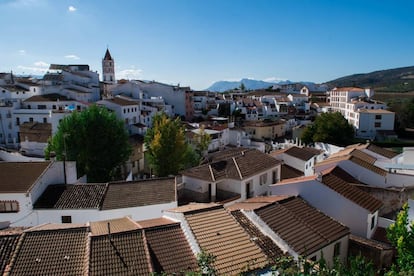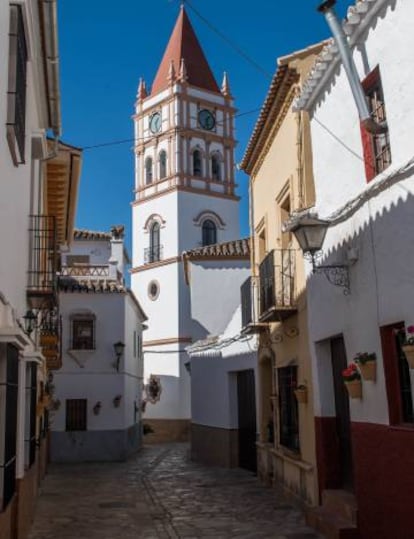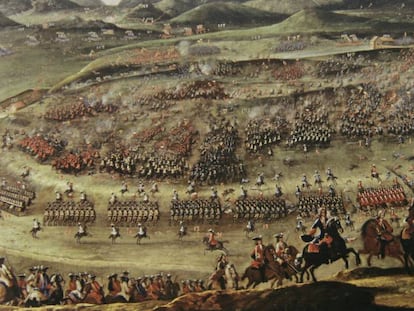The southern Spanish town that bought its independence
Arriate split from Ronda in 1661 but remained immersed in a feudal regime for another century

In Arriate, all roads lead to Ronda. ¡°If you were talking about an egg, we would be the yolk and Ronda the white,¡± explains one local. The town is surrounded by the neighboring municipality, to which it belonged until 1661. That year, and after many disputes, its inhabitants achieved independence after paying a large sum that they had managed to collect.
Our ancestors tried to become legally independent. They petitioned in the courts to get it Rafael Melgar, town resident
There was no sense of belonging to an area, as is the case with the Catalan independence movement of today. Instead, there was a yearning for freedom that gradually increased among its inhabitants, who paid the nobles an excessive amount in taxes and had to put up with harsh living conditions.
¡°I do not think there are many towns that have bought their independence,¡± says Rafael Melgar, one of the 4,500 residents of the town in M¨¢laga province. In his opinion, this fact defines the personality of the people from Arriate, because it reinforces their identity.
But Melgar also sees a clear difference between the history of the people of Arriate and the Catalan independence drive: ¡°Our ancestors tried to become legally independent. They petitioned the courts to get it, despite the power the nobles had.¡± After the Christian conquest of Ronda in 1485, the Crown of Castile granted the D¨¢vila family ¨C who had helped Queen Isabella I and King Ferdinand II fight Islamic rule ¨C the site of Arriate, then unpopulated.

The D¨¢vila family founded the village. Their former home is now used as a residence for the elderly. They built houses for the farmers who were beginning to settle in the area. The family worked the area for three centuries and, during that time, they established relations with other nobles: the Ovalle, the Loaysa and the Moctezuma families, the latter descendants of the last Aztec emperor.
The town¡¯s name comes from the Arab word Arriadh (the orchards), for the rich flora present when the Arabs inhabited the area. Today, Arriate ¨C a town of just 8.3 square kilometers, five kilometers from Ronda ¨C is still a predominantly agricultural place.
Failed attempts
In 1530, the Ovalle family established a right of succession that saw their firstborn son become sole heir to their possessions. However, they monopolized more land than they were entitled to, which gave rise to litigation.
¡°The peasants only wanted the right to work the land so they would not have to pay as much in taxes,¡± explains the historian Sergio Ram¨ªrez. The key lawsuit was that which began in 1619 between the Ovalle family and local residents, and which lasted seven years. Locals argued to the court that they had right of first refusal when the nobles were buying up the land. They acquired the town in 1631 on the back of the promise they would pay compensation to Ronda.
The dream of freedom did not even last five years. The debts they incurred forced the town to renounce their sovereignty in 1635. The lands returned to Ronda and the Ovalle family established even tougher conditions than before.
¡°It reminds me of Catalonia because there was division between pro-independence people and the critics of independence,¡± reflects Ram¨ªrez. He adds: ¡°If the Catalans say that Spain steals from them, then for Arriate it was the nobles who robbed them. The peasants had no rights or property; they lived to pay tribute.¡± The lords of Arriate continued to manage the town for decades, but their debts to the royal treasury offered the residents a new opportunity. On February 14, 1661, Felipe IV ratified the town¡¯s autonomy and exempted its residents from paying the debt.
We have very deep values. We boast about the town we have inherited Francisco Rosado, town resident
¡°We have very deep values. We boast about the town we have inherited,¡± says Francisco Rosado, another resident. Like many, he works in Ronda, a city with which they have maintained a tense relationship for centuries. ¡°We have already overcome our differences.¡±
Isabel S¨¢nchez rejects the existence of an Arriate nationality: ¡°We did not have our own flag until a few years ago. Our independence was not based on emotion, it was a struggle to acquire rights.¡± They obtained those rights definitively in September 1783, when the Royal Council granted the jurisdiction of the town to its citizens. Without knowing it, they had sown the seed of a new time: the end of feudalism, which was not abolished in Spain until the Constitution of 1812.
English version by Debora Almeida.
Tu suscripci¨®n se est¨¢ usando en otro dispositivo
?Quieres a?adir otro usuario a tu suscripci¨®n?
Si contin¨²as leyendo en este dispositivo, no se podr¨¢ leer en el otro.
FlechaTu suscripci¨®n se est¨¢ usando en otro dispositivo y solo puedes acceder a EL PA?S desde un dispositivo a la vez.
Si quieres compartir tu cuenta, cambia tu suscripci¨®n a la modalidad Premium, as¨ª podr¨¢s a?adir otro usuario. Cada uno acceder¨¢ con su propia cuenta de email, lo que os permitir¨¢ personalizar vuestra experiencia en EL PA?S.
En el caso de no saber qui¨¦n est¨¢ usando tu cuenta, te recomendamos cambiar tu contrase?a aqu¨ª.
Si decides continuar compartiendo tu cuenta, este mensaje se mostrar¨¢ en tu dispositivo y en el de la otra persona que est¨¢ usando tu cuenta de forma indefinida, afectando a tu experiencia de lectura. Puedes consultar aqu¨ª los t¨¦rminos y condiciones de la suscripci¨®n digital.










































